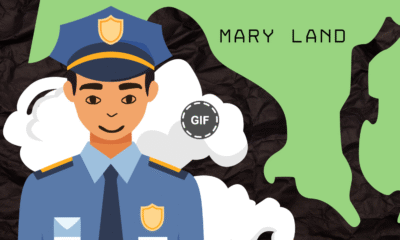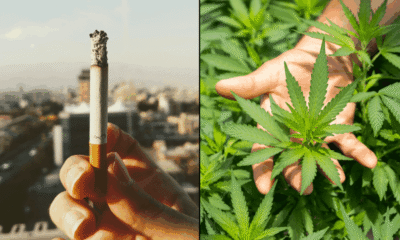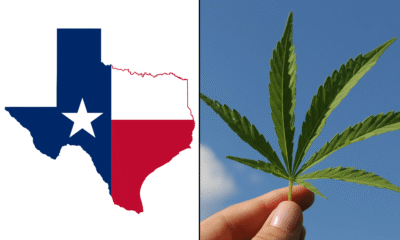Blunts & Moore
‘Multitude of reasons’ drove closure of first social equity dispensary in U.S.
Published
1 year agoon

When Blunts and Moore, the first-ever social equity cannabis dispensary in the nation, closed its doors for good this past March after almost six years in business, it was due to a confluence of factors. But failure of the social equity program itself was not one of them, owner Alphonso “Tucky” Blunt told Green Market Report.
“When people ask why Blunts and Moore closed, it’s kind of like a long answer. It’s a list of reasons. I tried to hold on,” Blunt said. “As far as the Oakland social equity program, I’ve said it before and I’ll say it again: That was a great decision. I’m ecstatic I was able to get the opportunity. It’s just like any program; it just needs fine-tuning.”
Forces collide
The dispensary – which was located right across the street from the Oakland Coliseum – suffered from the loss of three major sports teams to relocations (the NFL’s Raiders, the NBA’s Warriors, and MLB’s A’s have all left the Coliseum in recent years), near-constant burglaries, high repair costs from break-ins, and, perhaps most significantly, Blunt’s own lack of business experience.
“I’d say the number one reason was lack of business knowledge,” Blunt said. “Picking the wrong and right partners, not knowing, just because you don’t know what you don’t know.”
Not knowing how to properly vet potential business partners, he said, led first to a failed partnership with Brittany Moore – the other namesake of the Blunts and Moore moniker. When Moore exited the venture in 2021, another cannabis company that had originally partnered with Blunt’s social equity license to provide the the retail location, Grizzly Peak Farms, stepped in to run the day-to-day operations, Blunt said.
Last year, however, Blunt said he discovered that Grizzly Peak hadn’t been paying vendors in a timely fashion and that Grizzly Peak had been keeping “two sets of books” that showed it had overcharged or stolen up to $2.5 million from Blunts and Moore.
“They were stealing from me,” Blunt said. “That also led to the closure, because there was too much debt associated with the business that I had nothing to do with, nor did I know about.”
Blunt said that in September last year, he formally parted ways with Grizzly Peak and took over management of the store himself. But since Grizzly Peak owned the location, that led to his lease not being renewed, and the shop ended up closing.
Time to ‘move on’
Blunt alleged that Grizzly Peak ran up about $265,000 in vendor debt with cannabis products that were being dropped off but not immediately paid for, due to terms arrangements set up by Grizzly Peak with distributors.
That led to a spat with Grizzly Peak, he said, and threats of lawsuits were exchanged. Eventually the former partners agreed to both just walk away and pursue their own ventures without going to court.
“Legal action’s going to lead to paying someone to do legal action, cutting this in half and cutting that in half. I can walk away,” Blunt said, adding that he’s already gotten into the cannabis events space with his own limited liability corporation and is working on launching his own marijuana delivery service.
“Now I’m a storefront, but on the move. And I’m fine with that. I was able to pivot,” he said. “Sometimes you have to learn when to move on.”
Grizzly Peak founder David Gash strongly rejected Blunt’s allegations, and said it was Blunt who was responsible for the dispensary’s poor performance and ultimately the shop closing. Rather, Gash said, Grizzly Peak never made a dime from Blunts and Moore, and instead actually lost several hundred thousand dollars.
Gash added that he’s “saddened” by Blunt’s allegations, and that the store lease wasn’t renewed because Blunt became “hostile” last year towards him and Grizzly Peak.
“We were salt and pepper. We were boys. He just couldn’t handle the pressure of debt mounting all around him,” Gash said. “We never ever got paid one penny. That’s what kills me with this. Not one penny did we get paid, and Grizzly Peak gave him a quarter-million in product, fronted over the years. He just ran it into the ground.”
Gash said it’s true that Blunt lacked business acumen, which he said accounts for Blunt’s accusations of two sets of books.
“If he had a $2.5 million claim, and he had an attorney, why would you not sue us? That’s a giant number … His version of two books, it’s called P&L,” Gash said.
On top of that, he said, there were plenty of other market forces arrayed against the store and cannabis businesses in general, whether social equity or not.
“Yes, it was his business aptitude, but it was set up. The deck was stacked against him, because of overtaxation, economic issues, and Oakland being what it’s turned into,” Gash said, noting that the Coliseum neighborhood has been deemed one of the most dangerous in the country.
“We took great pride in being that first social equity program and dispensary. We gave it the best that we could, and unfortunately, it just couldn’t come together,” Gash said. “We could just never break through and get the momentum we had when we started, especially with all the sports teams bailing.”
For his part, Blunt said he holds no ill will toward Grizzly Peak, despite his allegations of theft, and said he’s actually grateful to Gash and the company for its help over the years.
“I’m in the best place I’ve been in since getting into the legal space since 2018. No question,” Blunt said. “I’m not even mad at Grizzly Peak. They taught me a lot. I had to learn and go through all this BS to be where I’m at now. I thank them for that. All the stuff I’ve learned about LLCs, I learned that from Grizzly Peak.”
Blunt said he’s also got no regrets about Blunts and Moore’s end, at least at its old location near the Coliseum. He emphasized he hasn’t closed the door on potentially opening another brick and mortar dispensary, but said he’d want to own the land if he does so.
“Blunts and Moore became a bill. I sell weed to make money,” Blunt said. “This was new to me. Like, no money and I can’t do nothing? And I was constantly rebuilding from break-ins. Nah, this is crazy. Let’s regroup.”

Author: mscannabiz.com
MScannaBIZ for all you Mississippi Cannabis News and Information.
You may like
-


GOP Senator Pushes To Study—Rather Than Ban—Hemp Products, As State Attorneys General Call For THC Prohibition
-


Happy International Champagne Day – The Fresh Toast
-


Maryland Police Want To Watch You Smoke Weed: Free Munchies and Ride Home Included
-


More Americans Now Use Marijuana Than Smoke Cigarettes, New Study Shows
-


Unexpected Pleasures of Weed: The Strain That Turned My Husband Into a Clean Freak
-


Texas Officials Adopt Rules To Expand Number Of Medical Marijuana Dispensaries In the State

GOP Senator Pushes To Study—Rather Than Ban—Hemp Products, As State Attorneys General Call For THC Prohibition

Happy International Champagne Day – The Fresh Toast

Maryland Police Want To Watch You Smoke Weed: Free Munchies and Ride Home Included

More Americans Now Use Marijuana Than Smoke Cigarettes, New Study Shows

Unexpected Pleasures of Weed: The Strain That Turned My Husband Into a Clean Freak

Texas Officials Adopt Rules To Expand Number Of Medical Marijuana Dispensaries In the State

Cannabis Ventures, Start-Up Best Practices, and Ways to Compete

Older Adults Increasingly Identify as Cannabis Consumers

Kentucky Governor Touts Surge In Medical Marijuana Patient And Business Approvals As State Prepares For Program Launch

SCOTUS cannabis & guns case gets delay request (Newsletter: October 24, 2025)

Ohio House Passes Cannabis, Hemp Bill Resulting From ‘Venn Diagram From Hell’

What To Know About Cannabis And A Brain Aneurysm

MariMed to Expand Brand Distribution to New York

Time for a Cannabis Reboot: Local Roots, Fair Markets, Real Change

Ohio Health Agency Grants $400,000 To Fund Psychedelics Education And Training For First Responders, Doctors And More

Curio Wellness Acquires 4 Greenlight Dispensaries in Missouri

The best places to be high in Seattle

Colombia’s Bold Offer to Trump: Legal Weed Exports for Peace

Trump DOJ Asks Supreme Court For Delayed Schedule In Case On Marijuana Users’ Gun Rights

Whiskey Company Scales Back Operations, Citing ‘Consumer Shifts’ Toward Marijuana As Alcohol Alternative

Smart Cannabis: The AI Revolution No Operator Can Ignore

New Jersey Gubernatorial Candidates Need To Step Up For Cannabis Consumers (Op-Ed)

Millennials Are Spending Big on Luxury Travel

West Virginia Medical Marijuana Revenue Is Supposed To Support Drug Treatment Programs, But Sits Unspent As Officials Worry About Federal Prohibition

Alert: Department of Cannabis Control updates data dashboards with full data for 2023

Connecticut Appoints The US’s First Cannabis Ombudsperson – Yes there is a pun in there and I’m Sure Erin Kirk Is Going To Hear It More Than Once!

5 best CBD creams of 2024 by Leafly

Recreational cannabis on ballot for third time in South Dakota

EU initiative begins bid to open access to psychedelic therapies
New Study Analyzes the Effects of THCV, CBD on Weight Loss

Free delta-9 gummies from Bay Smokes

5 best autoflower seed banks of 2024 by Leafly

Discover New York’s dankest cannabis brands [September 2024]

Press Release: CANNRA Calls for Farm Bill to Clarify Existing State Authority to Regulate Hemp Products

May 2024 Leafly HighLight: Pink Runtz strain

5 best THC drinks of 2024 by Leafly

Local medical cannabis dispensary reacts to MSDH pulling Rapid Analytics License – WLBT

6 best CBD gummies of 2024 by Leafly

Curaleaf Start Process Of Getting Their Claws Into The UK’s National Health System – With Former MP (Resigned Today 30/5/24) As The Front Man

Horn Lake denies cannabis dispensary request to allow sale of drug paraphernalia and Sunday sales | News

5 best delta-9 THC gummies of 2024 by Leafly

The Daily Hit: October 2, 2024

Mississippi city official pleads guilty to selling fake CBD products

Nevada CCB to Accept Applications for Cannabis Establishments in White Pine County – “Only one cultivation and one production license will be awarded in White Pine County”

Weekly Update: Monday, May 13, 2024 including, New Guide for Renewals & May Board meeting application deadline

5 best THCA flower of 2024 by Leafly

6 best hemp pre-rolls of 2024 by Leafly

PRESS RELEASE : Justice Department Submits Proposed Regulation to Reschedule Marijuana
Trending
-

 California Cannabis Updates1 year ago
California Cannabis Updates1 year agoAlert: Department of Cannabis Control updates data dashboards with full data for 2023
-

 Breaking News1 year ago
Breaking News1 year agoConnecticut Appoints The US’s First Cannabis Ombudsperson – Yes there is a pun in there and I’m Sure Erin Kirk Is Going To Hear It More Than Once!
-

 best list1 year ago
best list1 year ago5 best CBD creams of 2024 by Leafly
-

 Business1 year ago
Business1 year agoRecreational cannabis on ballot for third time in South Dakota
-

 Business1 year ago
Business1 year agoEU initiative begins bid to open access to psychedelic therapies
-

 cbd1 year ago
cbd1 year agoNew Study Analyzes the Effects of THCV, CBD on Weight Loss
-

 Bay Smokes1 year ago
Bay Smokes1 year agoFree delta-9 gummies from Bay Smokes
-

 autoflower seeds1 year ago
autoflower seeds1 year ago5 best autoflower seed banks of 2024 by Leafly
